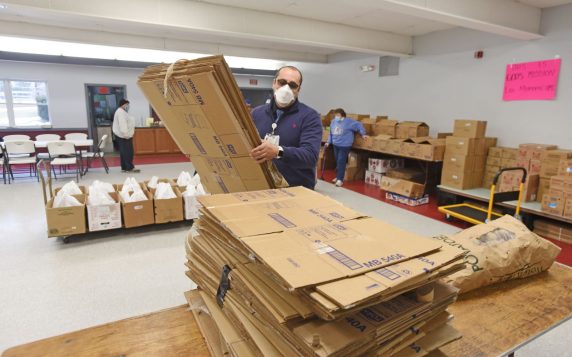
Healthcare can be unhealthy for Mother Earth.
That fact is not lost on Roger Piper, Hartford Healthcare’s Director of Environmental Services and Patient Transport. This Earth Day (April 22), he’s proud of the many efforts under way and in the works to help Hartford Healthcare save lives while saving the planet we call home.
Piper is also a realist.
“Killing germs takes tough stuff,” he said. “It requires disinfectants, and technically any disinfectant is a pesticide.” In fact, that’s how the Environmental Protection Agency classifies sanitizers and materials that kill bacteria, viruses and fungi – the nasty stuff that makes people sick. So, there’s no truly “green” hospital-strength disinfectant. It’s possible, though, to make sustainable choices with other cleaning products, like using ammonia-free glass cleaner and eliminating aerosols.
Still, there’s a lot of work being done to conserve more energy, control waste and lessen chemical usage – all of which helps to heal the environment.
- Modern equipment: Up-to-date devices and machinery reduce water use – think about all the floor-washing and carpet-cleaning that happens in hundreds of facilities every day. These cut down on electricity use because, generally, “the newer it is, the more energy-efficient it is,” Piper says. Wherever possible, battery-powered equipment is avoided because the spent batteries eventually become hazardous waste.
- Recycling: Healthcare literally generates mountains of garbage – some of it medical, much of it not. By one estimate, the nation’s nearly 1 million hospital beds produce about 6 million tons of waste a year. “So we recycle everything we can,” says Piper. “Plastics, cardboard, paper, printed materials. We are really good at this.”
- Keeping confidences: Although much healthcare information has gone digital, lots of printed material still contains information about patients’ conditions and treatments. Piper calls this “confidential waste” and Hartford HealthCare disposes of this in special lock boxes that are shredded and recycled by vendors who specialize in this work.
- All that food: “In several of our hospitals, food waste is composted,” Piper says. “There’s a double benefit to this, because the weight of this would cost three times more to dispose of as solid waste – what most people call ‘trash.’” By recycling, Hartford HealthCare is able to earn LEED (Leadership in Energy and Environmental Design) credits for this waste.
- Waste not: Being good energy stewards in healthcare is a lot like doing it at home – multiplied a thousand-fold. Lights and water use add up quickly. So sensors that shut off lights when a room is unoccupied and timers on faucets so spigots aren’t left running help cut costs and save immense resources every day.
“We have a role to play in reducing waste and creating more sustainable options,” Piper says proudly. Think of it as creating a healthier environment – for the environment.


